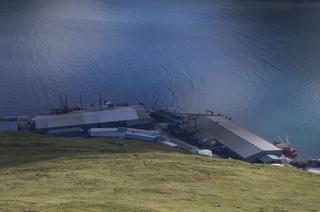Aleutian Processors Snag Business From Kodiak Plants

Wednesday, April 03 2013
For the past year, pollock and cod fishing off Kodiak has been booming -- but processing plants in town say they aren’t seeing enough of that business. That’s because more than 14 million pounds of pollock and cod caught near Kodiak during the 2012 "B" season was shipped to plants in Akutan, King Cove, and Sand Point.
Matt Moir, the plant manager for Alaska Pacific Seafoods, made an impassioned plea to Kodiak city council at a recent meeting.
"That’s probably one trip, per vessel, that would have delivered here -- pollock and cod. It’s a bad deal. That’s the first time it’s ever happened, and there’s nothing stopping it from happening again. You need to know about it."
James Brooks is covering the story for the Kodiak Daily Mirror. KUCB's Lauren Rosenthal spoke with him to get more details on the cause for this shift to the Aleutians, and what it means for the city of Kodiak.
Rosenthal: Can you explain what trends you’ve been seeing in the pollock fishery near Kodiak?
Brooks: During the pollock “B” season, for the first time, there was a large concentration of boats who were taking fish from waters that usually deliver to Kodiak. They loaded fish onto tenders and those tenders went west to places like Sand Point and King Cove, which really worries a lot of people in Kodiak.
Rosenthal: And what are they concerned about?
Brooks: Kodiak’s reliant on its processing and industry. This is a fishing town just like Dutch Harbor, and when fish doesn’t come here, that means less tax revenue for the city. But even more importantly, it means potentially fewer processing hours for the people who live here.
Kodiak has a processing population that’s approximately 50% resident, so when people don’t get hours here in Kodiak, that impacts the entire community. So we’re not just talking tax revenue. We’re talking about people who rely on processing for their jobs.
Rosenthal: Can you explain what makes the western Aleutian plants more attractive, because I understand there are also some drawbacks.
Brooks: The western Aleutian plants are larger than Kodiak’s plants. At least, they tend to be. So if a company has its fleet and doesn’t want to share with its competitors in Kodiak, they can decide to say, ‘We’ll take that fish and stick it on a tender, and take it west.’ Because those fish take longer to get to the plant, they’re in worse condition and they might be less valuable.
But at the same time, if they don’t have the processing capacity in Kodiak, they’re left with a tough decision. Do they yield some of that fish to their competitors or do they just take the lower-value fish and take what they can get out of it in the west?
Rosenthal: You mentioned in your story that the catch share system might be playing a part in this. Can you explain how that works?
Brooks: Right now, there’s some concern about whether or not the people sending fish west are fishing for history. In the past, the federal government has looked at what people have done before to say, ‘You get this part of the fishery.’ If you’ve participated in a big way before and caught a lot of fish, you’re ostensibly going to get more share of this program.
Now, the North Pacific [Fishery Management] Council has said after a certain date – and that date has already passed – they will not take that part of history into account. So they could come back and say, ‘Well, we decided on this date. But it’s taken us so long [that] that history is now ancient history and we need more recent history.’ So that’s the concern now. Even though they said this season won’t be counted, there’s no certainty that that won’t change.
Rosenthal: Is there any way for Kodiak to make itself more attractive to these fishermen again?
Brooks: This week is the North Pacific Fishery Management Council Meeting in Anchorage, and I’d expect there to be some fairly sharp comments there from either processors who missed out on that fish or from people in Kodiak who are concerned about the process.
Beyond that, the decision lies with the processors at this point. Obviously, there’s a lot of talk about catch shares. But the drivers are out there in the community. The processors and the fishermen: they have the final words on this.
Rosenthal: Thank you so much for talking with me and explaining this issue. [That's] James Brooks, the editor of the Kodiak Daily Mirror.
Brooks: Thank you. It’s been a pleasure.



